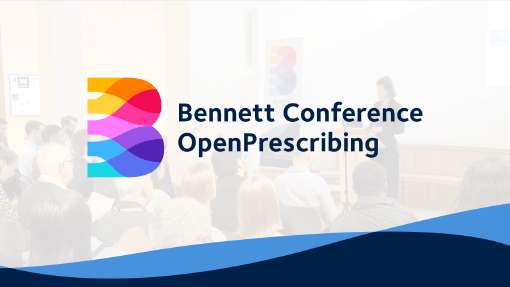OpenPrescribing blog posts

Improvement Radar: A new OpenPrescribing tool to identify best practice
We’ve launched a new OpenPrescribing tool, the Improvement Radar, which makes it easy to identify organisations which have shown substantial improvement.
Read more about Improvement Radar: A new OpenPrescribing tool to identify best practice →
STAR-PUs - should we still be using them?
In this blog we explain some of the issues with using STAR-PUs and ask for your input on how we should use them in future.
Read more about STAR-PUs - should we still be using them? →
OpenPrescribing Winter 2023/2024 Newsletter
This newsletter contains all the latest updates from OpenPrescribing
Read more about OpenPrescribing Winter 2023/2024 Newsletter →
Spot the difference. Part 2: Analytic Choices
In the second of a two-part blog we explain why OpenPrescribing figures don’t always match with other prescribing data resources, due to differences in how data is presented.
Read more about Spot the difference. Part 2: Analytic Choices →
Spot the difference. Part 1: Source Datasets
In the first of a two-part blog we explain why OpenPrescribing figures don’t always match with other prescribing data resources, due to differences in the data source.
Read more about Spot the difference. Part 1: Source Datasets →
What makes a good OpenPrescribing measure?
This blog describes how we develop new measures at OpenPrescribing.
Read more about What makes a good OpenPrescribing measure? →
Bennett Conference session 2: OpenPrescribing
The second session in the Bennett Conference was a series of talks covering the history, technical underpinnings, research and use cases of OpenPrescribing.
Read more about Bennett Conference session 2: OpenPrescribing →
BNF to dictionary of medicines and devices (dm+d) map - now available
A common question asked of the Bennett Institute is ‘have you got a tool to map BNF codes to dm+d codes?’ We’ve created one to download
Read more about BNF to dictionary of medicines and devices (dm+d) map - now available →
Four new measures available on OpenPrescribing.net (and four have been retired)
We’ve been busy creating new measures for OpenPrescribing.net, and reviewing ones which aren’t needed any more.
Read more about Four new measures available on OpenPrescribing.net (and four have been retired) →
Recent improvements in OpenPrescribing.net measures
We’ve been busy doing housekeeping on OpenPrescribing.net measures. Here’s a summary of the main changes.
Read more about Recent improvements in OpenPrescribing.net measures →
OpenPrescribing Autumn 2023 Newsletter
OpenPrescribing Autumn 2023 Newsletter.
Read more about OpenPrescribing Autumn 2023 Newsletter →
Lifting the Lid on Special Container Changes
In this blog, we describe how OpenPrescribing tools helped identify and investigate a sudden £450k per month increase in NHS expenditure
Read more about Lifting the Lid on Special Container Changes →
NHS England Medicines Optimisation Opportunities - A new dashboard on OpenPrescribing
In this blog we describe how to use and access the NHS England Medicines Optimisation Oppurtunitites dashboard on OpenPrescribing
Read more about NHS England Medicines Optimisation Opportunities - A new dashboard on OpenPrescribing →
OpenPrescribing in the media - recent highlights
At the Bennett Institute for Applied Data Science we’re always pleased to see stories in the media which have used OpenPrescribing.net. Here are some of the highlights of stories that we have been featured in recently.
Read more about OpenPrescribing in the media - recent highlights →
Introduction to the Clinical Informatics Team
Here we introduce the Bennett Institute’s Clinical Informatics team, explaining what they do and how their experience in NHS clinical practice helps them do this.
Read more about Introduction to the Clinical Informatics Team →
Identifying over prescribed chemicals: a data-driven approach to mining prescription data
One of our key aims at Bennett Institute for Applied Data Science is to develop novel data-driven approaches to interpret our health care data. We want to use data science to identify patterns in the data that afford us a new, unbiased perspective on how well the NHS is working and how it could be better.
Read more about Identifying over prescribed chemicals: a data-driven approach to mining prescription data →
Difference between BNF, dm+d and SNOMED CT codes
Bennett Institute resident pharmacist Brian MacKenna sets out some brief information on how we currently build medicines codelists on OpenSAFELY.
Read more about Difference between BNF, dm+d and SNOMED CT codes →
OpenPrescribing June 2022 Newsletter
Our latest newsletter including information on: Bennett Institute for Applied Data Science, we are recruiting, Goldacre Review, updated Outlier Dashboards, recent changes to OpenPrescribing Measures, OpenSAFELY news, and new data news.
Read more about OpenPrescribing June 2022 Newsletter →
Identifying outlier prescribing behaviour: how is your practice unusual?
We have a new tool available at OpenPrescribing: our outlier prescribing dashboards will show you what your favourite CCG, PCN, STP or practice are prescribing more (or less) than everyone else. Read more about how it works and how to use it here.
Read more about Identifying outlier prescribing behaviour: how is your practice unusual? →
OpenPrescribing December Newsletter
Our latest newsletter including information on: We are recruiting, recent changes to OpenPrescribing Measures, new Outlier Prescribing tool, maps update, recent research publications, OpenSAFELY news, and new data news.
Read more about OpenPrescribing December Newsletter →
Changes to OpenPrescribing.net measures
Recently we started reviewing a number of measures that needed the most urgent attention. As a result a number have been updated and a couple have been retired.
Read more about Changes to OpenPrescribing.net measures →
OpenPrescribing March Newsletter
Our latest newsletter including information on: new job roles, hospital only measure, total oral morphine equivalence measures, OpenPrescribing and Bennett Institute Papers.
Read more about OpenPrescribing March Newsletter →
OpenPrescribing Newsletter November 2020
We have been very busy since our last newsletter back in July and there are tonnes of exciting updates for you here! Measure Update: Total Oral Morphine Equivalence The Faculty of Pain Medicine has recently updated their recommendation on oral morphine equivalence (OME) which we use on our OpenPrescribing measure of OME. We have taken this opportunity to update and a new novel implementation of how we assess OME. Until this work is completed we have taken the decision to “suspend” the measure from dashboards however you can still view the old method using this link.
Read more about OpenPrescribing Newsletter November 2020 →
Biologic Medicines for Severe Asthma
Victory! We have the hospital medicines data. Now: biologic medicines for severe Asthma In July, Ben and Brian wrote a piece in the British Medical Journal arguing that hospital medicines data should be openly shared. Magnificently, the NHS has now made secondary care medicines data (SCMD) available. You can read the full technical specification of the data here but briefly: it is hospital pharmacy stock control data, which is collected and processed by Rx-Info, and is now published on the NHS Business Services Authority website in the NHS dm+d standard we know, love, and have documented well.
Read more about Biologic Medicines for Severe Asthma →
OpenPrescribing
This is the website code for https://openprescribing.net - a Django application that provides a REST API and dashboards for the English Prescribing Dataset published by the NHS Business Services Authority. Information about data sources used on OpenPrescribing can be found here.
Read more about OpenPrescribing →
OpenPrescribing July Newsletter
OpenPrescribing and Bennett Institute Papers It has been a busy month for paper publication at The Bennett Institute. We have written a brief description of the most recent papers below. Please sharewith colleagues and get in touch if you have any relevant observations! Remember you can read all our academic papers related to OpenPrescribing on our research page. Hospital medicines data: We are frequently contacted at OpenPrescribing about when we are going to make a hospital version.
Read more about OpenPrescribing July Newsletter →
NHS Dictionary of medicines and devices (dm+d): primary care prescribing of "hospital only" medicines
Update May 2021 Based on feedback received from users, the NHS dictionary of medicines and devices has decided to cease maintenance of the “hospital only” value at AMP level (it remains at AMPP level). As a result this means that we are no longer able to produce our “Hospital Only measure” and we have retired it. Just prior to the COVID-19 emergency we launched a new measure on OpenPrescribing, primary care prescribing of medicines defined by the NHS dictionary of medicines (dm+d) and devices as “hospital only”.
Read more about NHS Dictionary of medicines and devices (dm+d): primary care prescribing of "hospital only" medicines →
How I use OpenPrescribing in my practice as a GP
A guest blog from Dr. Kevin Barrett (Twitter @DrKBarrett). Last week the British Journal of General Practice published our paper on unsafe prescribing of methotrexate. As part of the publication Dr. Kevin Barrett talked to BJGP (see video below) about how he used OpenPrescribing to identify potentially unsafe prescribing in his practice and has also written a short blog below. When I first started as a GP trainee in 1999 electronic prescribing was a relatively recent innovation.
Read more about How I use OpenPrescribing in my practice as a GP →
OpenPrescribing June Newsletter
Methotrexate Prescribing Safety — New paper in BJGP This week the British Journal of General Practice published our latest paper on unsafe prescribing of methotrexate. We found that the prevalence of unsafe methotrexate prescribing (10mg tablets) has reduced but remains common, with substantial variation between practices and CCGs. In the paper we also discuss recommendations for better strategies around implementation. Anyone can view the live data on unsafe methotrexate prescribing at openprescribing.
Read more about OpenPrescribing June Newsletter →
Your Organisation's OpenPrescribing Custom Email Alerts
At OpenPrescribing we know that clinicians can be overwhelmed with guidance and data about many different aspects of care. We therefore have developed an innovative email alert service for every single practice, primary care network and clinical commissioning group in England that delivers bespoke custom emails to your inbox about your own organisations prescribing. To sign up to your organisation’s alerts all you need to do is: Go your organisation’s homepage.
Read more about Your Organisation's OpenPrescribing Custom Email Alerts →
OpenPrescribing Newsletter May 2020
OpenSAFELY.org OpenSAFELY is a new secure analytics platform for electronic health records in the NHS, created to deliver urgent results during the global COVID-19 emergency. OpenSAFELY is a collaboration between the Bennett Institute, the EHR group at London School of Hygiene and Tropical Medicine and TPP who produce SystmOne. OpenSAFELY is now successfully delivering analyses across more than 24 million patients’ full pseudonymised primary care NHS records. The first analysis from OpenSAFELY is Factors associated with COVID-19-related hospital death in the linked electronic health records of 17 million adult NHS patients with more answers to important questions expected shortly.
Read more about OpenPrescribing Newsletter May 2020 →
Impact of COVID-19 on prescribing in English general practice: March 2020
OpenPrescribing.net has been updated this week with the latest release of prescribing data covering March 2020. In-depth analysis will be needed over the coming months, but this release gives us the first glimpse into the impact that COVID-19 has had on prescribing. At the Bennett Institute we have been quite busy with the new secure analytics platform OpenSAFELY but the following blog is a rapid analysis of the March prescribing data which others may find helpful to focus their own investigations.
Read more about Impact of COVID-19 on prescribing in English general practice: March 2020 →
What are the most commonly prescribed medicines? Top 10 prescribed medicines in NHS England primary care for 2019
The following is a rapid analysis of the “top 10” medicines in NHS England primary care in 2019. We prepared this analysis for a user who wanted to use the list in a teaching session with students to prepare them for the medicines they will most commonly see in general practice. We are sure others will find it useful — please get in touch and tell us how you use it via Twitter or feedback@openprescribing.
Read more about What are the most commonly prescribed medicines? Top 10 prescribed medicines in NHS England primary care for 2019 →
Changes to NHS medicines data: a rapid analysis from the Bennett Institute
At the Bennett Institute we like to work in the open and share our insights for the whole community, so we can fix a problem for us, then share the solution, and help fix it for everyone. We think this is efficient for us and the whole system. In this blog our magnificent coder Peter Inglesby sets out some analysis he has done of changes to the NHS prescribing data we use.
Read more about Changes to NHS medicines data: a rapid analysis from the Bennett Institute →
NHS England Investment and Impact Fund — A new dashboard on OpenPrescribing
Update September 2020: NHS England have announced a reduction in the number of planned measures including the majority of the measures on OpenPrescribing. We will remove the IIF dashboard in a future update. Update: Due to COVID19 response NHS England has announced that the IIF will be postponed. We will continue to make this dashboard available as NHS England also states that they will continue to monitor the data to understand any impact.
Read more about NHS England Investment and Impact Fund — A new dashboard on OpenPrescribing →
OpenPrescribing.yourcountry
At the Bennett Institute we get many people contacting us every month asking us when OpenPrescribing will be available in their country. In this blog we are outlining OpenPrescribing.yourcountry where we give you the information that you can use locally to build a case for OpenPrescribing in your country and obtain funding to support development. We aren’t quite ready to build OpenPrescribing.yourcountry yet, but we will be soon and we wanted to share our plans so you can be ready when we are.
Read more about OpenPrescribing.yourcountry →
Bennett Institute – What We Did Last Year!
Most people share their end of year roundup during late December when everyone is too full of cake to read. Now you’re back in the saddle, here’s our roundup of everything the Bennett Institute threw out into the world over the previous 12 months! OpenPrescribing OpenPrescribing.net went from strength to strength, with over 135,000 unique users last year. We now have over 80 measures of prescribing safety, efficacy and cost-effectiveness and have been working on new types of measures and alerts to identify “outlier” prescribing, such as with zuclopenthixol.
Read more about Bennett Institute – What We Did Last Year! →
Greener NHS Prescribing Dashboards
Today on OpenPrescribing.net we have launched our Greener NHS prescribing dashboards. Over recent months there has been increasing attention on the environment and the effects society is having on climate change. The NHS announced specific targets as part of its long term plan to become more sustainable, reduce waste and shift to lower carbon inhalers. At OpenPrescribing we have already launched our first prescribing measure related to the environment and this week we are launching our Greener NHS prescribing dashboard for every single general practice, primary care network (PCN), clinical commissioning group (CCG), sustainability and transformation partnership (STP), NHS region and for the whole of England.
Read more about Greener NHS Prescribing Dashboards →
National Institute for Health and Care Excellence — NICE Prescribing Dashboards
Today on OpenPrescribing.net we have launched our National Institute for Health and Care Excellence — NICE Prescribing Dashboard. We have a NICE prescribing dashboard for every single general practice, primary care network (PCN), clinical commissioning group (CCG), sustainability and transformation partnership (STP), NHS region and for the whole of England. This allows anyone to explore how NICE guidance has been implemented in their organisation, supporting effective, safer and more efficient prescribing.
Read more about National Institute for Health and Care Excellence — NICE Prescribing Dashboards →
OpenPrescribing Newsletter November 2019
PCN Dashboards Now Live! We have now launched our long-awaited Primary Care Networks (PCNs) dashboard, made possible thanks to the the membership list being published by NHS England last week. We have PCN prescribing dashboards for every single NHS PCN and their member general practices. (Don’t know your PCN’s name? You can find it on your practice dashboard). This allows anyone to explore NHS prescribing patterns in their PCN and how this compares to others across England — supporting safer, more efficient prescribing.
Read more about OpenPrescribing Newsletter November 2019 →
High Dose Dexamethasone
A guest blog from Calum Polwart (Twitter @ShinyBlackShoe) At the Bennett Institute we value openness and transparency as we believe open discussion of ideas and methods are the key ingredients for high quality data analysis. We think it is unhelpful that so much NHS data analysis is outsourced, or done behind closed doors, as this prevents coalface clinicians from engaging with data and sharing their expertise and insights. We build OpenPrescribing.
Read more about High Dose Dexamethasone →
Primary Care Networks (PCN) Dashboards — A new prescribing dashboard on OpenPrescribing
Today on OpenPrescribing.net we have launched our Primary Care Networks (PCNs) dashboard. We have PCN prescribing dashboards available for every single NHS PCN and their member general practices. This allows anyone to explore NHS prescribing patterns in their PCN and see how this compares to other PCNs across England — supporting safer, more efficient prescribing. Figure 1: South Islington PCN OpenPrescribing Dashboard What are NHS PCNs? PCNs are groups of practices, which together serve communities of around 30,000-50,000 people, with the aim of improving care for patients.
Read more about Primary Care Networks (PCN) Dashboards — A new prescribing dashboard on OpenPrescribing →
OpenPrescribing Newsletter October 2019
New Paper in BMJ Our newest paper is now out in the BMJ! Here we show huge variation in adoption of warranted changes in prescribing behaviour, using some exciting new openly available change detection methods. New measures We now have over 80 measures! This month we have launched a range of new measures. As always, measures are prioritised on your dashboard by potential for improvement so you can quickly and easily spot where your organisation is an outlier.
Read more about OpenPrescribing Newsletter October 2019 →
New Measure — Inhalers and the Environment
At the Bennett Institute we regularly collaborate on projects, both small and large, with users who get in touch. For development of this measure we would like to thank the NHS England Sustainable Unit and Centre for Sustainable Healthcare for their input on our work to support the NHS Long Term Plan. Another one of our collaborators on this work is Nicola Read, a respiratory doctor who is currently one of the National Medical Director’s Clinical Fellows.
Read more about New Measure — Inhalers and the Environment →
New Measure: Seven Day Prescribing for Long-term Conditions
This week we launched a new measure of seven day prescription for medicines used to treat long-term conditions. There is no current consensus on duration of prescription across the NHS and prescribers are advised that they should write a prescription for a duration that is clinically appropriate. For medicines that are for stable long-term conditions many areas have policies in place recommending one, two, or three month prescriptions. What are Medicines Compliance Aids?
Read more about New Measure: Seven Day Prescribing for Long-term Conditions →
Zuclopenthixol Acetate: a new kind of measure on OpenPrescribing
Zuclopenthixol is an antipsychotic used for schizophrenia and other psychoses. In the UK, there are two injectable forms of zuclopenthixol: zuclopenthixol acetate : a short acting treatment used for acute episodes zuclopenthixol decanoate : a long acting treatment used for maintenance This week we launched a new measure to support a new type of alert to identify any prescriptions of zuclopenthixol acetate for further investigation. It is not recommended to be prescribed in primary care, so prescriptions may have been prescribed in error.
Read more about Zuclopenthixol Acetate: a new kind of measure on OpenPrescribing →
OpenPrescribing Newsletter September 2019
New Feature! Measures linked to Analyse page Following many requests from users, we have created links from our measures to the corresponding search on the Analyse page. This is particularly useful if you want to see multiple practices or CCGs on one chart, view the results on a map, or see exactly which products are included in the measure. You will notice this is not yet available for all of our measures (which now number close to 100), due to the complex way some measures are constructed.
Read more about OpenPrescribing Newsletter September 2019 →
OpenPrescribing Newsletter Summer 2019
New Feature! DM+D browser This week we have launched a new browser for the NHS Dictionary of Medicines and Devices, better known as dm+d. dm+d is the standard dictionary for the medicines and devices used across the NHS. At last count there were over 150,000 packs of medicines and devices described. You can read more about the dm+d in [this detailed blog]/blog/2019/08/what-is-the-dm-d-the-nhs-dictionary-of-medicines-and-devices/). We have been using the dm+d browser internally for a while, and having found it very useful we believe it will come in handy for others too, so we have now made it available publicly for anyone to use.
Read more about OpenPrescribing Newsletter Summer 2019 →
NHS dm+d browser — A New Feature on OpenPrescribing
This week we have launched a new browser for the NHS Dictionary of Medicines and Devices, better known as dm+d. dm+d is the standard dictionary for the medicines and devices used across the NHS. It contains codes and descriptions for all these medicines and devices; at last count there were over 150,000 packs of medicines and devices described. You can read more about the dm+d in this detailed blog. What is the dm+d browser?
Read more about NHS dm+d browser — A New Feature on OpenPrescribing →
What is the dm+d? The NHS Dictionary of Medicines and Devices
Over the past year we have been increasingly using NHS Dictionary of Medicines and Devices (dm+d). This blog post sets out to describe dm+d for the benefit of the wider prescribing analytics community and others. What is the NHS Dictionary of Medicines and Devices (dm+d)? dm+d is the standard dictionary for the medicines and devices used across the NHS. It contains standardised codes, descriptions, and metadata (such as price and pack size) for every entry.
Read more about What is the dm+d? The NHS Dictionary of Medicines and Devices →
OpenPrescribing Newsletter June 2019
New low-priority measures approved Yesterday (27 June), NHS England completed its consultation on an additional proposed set of products being considered for a recommendation against regular use in primary care. Therefore, on the site we have now included these new items in the set of low-priority measures. The newly added products include bath and shower emollients, higher cost insulin pen needles and dronedarone. See how your practice or CCG is performing on these measures here, or navigate to the Low Priority measures from your favourite organisation’s dashboard.
Read more about OpenPrescribing Newsletter June 2019 →
Additional Functions on Analyse page - multi-level searching and STP/NHS England regions
Our technical team are busy improving how the engine room of OpenPrescribing. When they’ve finished we’ll get them to write a blog on exactly what they’ve done. In the meantime, as the work progresses we are able to add some additional exciting new features to the site. Multi-level analysis One of the limitations of how our Analyse page worked was the ability to only search at one BNF level at a time.
Read more about Additional Functions on Analyse page - multi-level searching and STP/NHS England regions →
Custom Organisation Groupings: OpenPrescribing Plan for Organisations like Primary Care Networks
Update November 2019: Our NHS PCN dashboards are now live at https://openprescribing.net/pcn/ and you can read more on our launch blog. Update August 2019: Our amazing developers have written all the code necessary to display all prescribing measures and data for all PCNs in England on OpenPrescribing. Unfortunately there is no national list of PCNs and their membership available, as soon as this is published we will bring you our prescribing dashboards.
Read more about Custom Organisation Groupings: OpenPrescribing Plan for Organisations like Primary Care Networks →
OpenPrescribing Newsletter May 2019
Varied implementation of UTI prescribing guidelines One of our recent papers, published in the Journal of Antimicrobial Chemotherapy, highlighted variability in the speed at which different CCGs switched from prescribing trimethoprim to nitrofurantoin (as recommended by PHE for uncomplicated UTI). It appears that the practices which changed the most were in CCGs that had taken some action to promote the new guidelines, such as a change in formulary. What are the implications?
Read more about OpenPrescribing Newsletter May 2019 →
How can we improve the management of necessary changes in clinical practice?
Just before Christmas we had a paper published in the Journal of Antimicrobial Chemotherapy. It looked at how GP practices responded to changes to the guidance for antibiotics for urinary tract infections (UTIs). It’s an interesting story in itself, but we think that it prompts some wider questions about how GPs are helped to keep up-to-date on guidance on prescribing. What is the issue? For many years the mainstay of antibiotic treatment of uncomplicated UTIs in women has been trimethoprim.
Read more about How can we improve the management of necessary changes in clinical practice? →
All England Alerts : A New Feature on OpenPrescribing
This week we have launched a new email alerting service that covers all of NHS England. Many users of OpenPrescribing already receive our monthly newsletter and our innovative email alert service for practice and CCG prescribing measures and for price concessions. We have now developed this service covering all of England based on user feedback. To sign up, just go to the All England page and enter your email address in the box beside the measures categories (see screenshot below).
Read more about All England Alerts : A New Feature on OpenPrescribing →
Communicating variation in prescribing - Why We Use Deciles
On OpenPrescribing.net we provide data for individual practices and CCGs (and now STPs and regions!) making it easier for everyone to explore NHS prescribing patterns in England - supporting safer, more efficient prescribing. However, providing data for an individual location in isolation is rarely useful. We need to provide context, so that some sort of judgement can be made about whether the prescribing in question is especially high or low, and how extreme it is, in comparison with others.
Read more about Communicating variation in prescribing - Why We Use Deciles →
Openness and Transparency: why is openness and transparency important for good data analysis and how does OpenPrescribing embody it?
At the Bennett Institute we value openness and transparency as we believe open discussion of ideas and methods are the key ingredients for high quality data analysis. We think it is unhelpful that so much NHS data analysis is outsourced, or done behind closed doors. This blog sets out the steps we take with OpenPrescribing.net to ensure all our analysis and methodology is freely available for inspection, review, and importantly re-use, by anyone.
Read more about Openness and Transparency: why is openness and transparency important for good data analysis and how does OpenPrescribing embody it? →
NHS price concessions cost charities and local authorities an additional £5.6 million last year
In the last year we estimate that price concessions have cost an additional £165 million in unplanned expenditure for Clinical Commissioning Groups (CCGs), and our OpenPrescribing.net price concession calculator was featured in a major BBC news story and in the Pharmaceutical Journal this week. However, interestingly, NHS price concessions do not just affect the NHS: they also represent unplanned expenditure for charities, local councils, and others. Here, we report our estimate of the impact on non-CCG organisations as an additional £5.
Read more about NHS price concessions cost charities and local authorities an additional £5.6 million last year →
NHS Regional and STP Dashboards — A new Feature on OpenPrescribing
Today we launched NHS regional and STP dashboards on <OpenPrescribing.net>, which allow anyone to see NHS prescribing patterns across areas larger than CCGs. You can find these new dashboards under “Area and Practice Dashboards”. What is an NHS STP or Region? The NHS across England is now organised into Sustainability and Transformation Partnerships (STPs) and NHS England regions. There are 44 STPs made up of NHS organisations such as CCGs and hospital trusts, and local councils, who developed shared proposals to improve health and social care, whilst ensuring services are joined up across all of the organisations they incorporate.
Read more about NHS Regional and STP Dashboards — A new Feature on OpenPrescribing →
Building new prescribing measures - we need your help
At OpenPrescribing we have a range of prescribing measures that makes it easier for everyone to explore NHS prescribing patterns in England - supporting safer, more efficient prescribing. We now have 70 measures including our two latest on Freestyle Libre and herbal medicines, that we recently blogged about. The measures are available for for every single practice and CCG in England and cover a range of clinical areas such as medication safety and antimicrobial stewardship to support better prescribing.
Read more about Building new prescribing measures - we need your help →
OpenPrescribing February 2019 newsletter
New Price Concessions alerts We have introduced a new email alert service, built upon our recently-launched NHS Price Concession calculator, which shows the cost impact of concessions for every single practice, CCG and for all of England combined. If you sign up for these new alerts, an email will pop into your inbox soon after a new price concession is announced (approximately once per week) to update you on the impact these costs are predicted to have on your practice/CCG.
Read more about OpenPrescribing February 2019 newsletter →
Ghost Branded Generics - How to fix it
Ghost Branded Generics are a relatively new category of cost-saving opportunities, caused by prescribers specifying a manufacturer for a generic product, often resulting in a higher reimbursement price compared to the true generic. We estimate the problem costs the NHS £11.6m a year. We have written about this extensively since our first blog on discovering the issue and developed a Ghost Branded Generics dashboard and measure for every practice and CCG in England.
Read more about Ghost Branded Generics - How to fix it →
NHS Price Concession Alerts — A new feature on OpenPrescribing
Today we launched a new feature on OpenPrescribing: an NHS Price Concession email alerts service. This is in addition to our existing calculator that shows cost impact of price concessions, which can already be viewed on every practice, CCG and All England dashboard. You can read more about price concessions (aka NCSO) in our previous blogs. Many users of OpenPrescribing receive our monthly newsletter and our innovative email alert service for practice and CCG prescribing measures.
Read more about NHS Price Concession Alerts — A new feature on OpenPrescribing →
QIPP Planning: How To…
…Identify CCG Cost Savings Opportunities using OpenPrescribing.net Every year in the NHS local teams around the country put together “QIPP Plans”. QIPP stands for Quality, Innovation, Productivity and Prevention and is a large scale programme introduced across the NHS to ensure the NHS delivers more for the same funding. We make no comment on the programme itself but we think OpenPrescribing is a useful tool in helping develop “QIPP Plans” and to identify new areas for savings related to medicines spend.
Read more about QIPP Planning: How To… →
Two new measures on OpenPrescribing — Herbal medicines and Freestyle Libre
We have recently released two new measures on OpenPrescribing — the prescribing costs of herbal medicines, and the quantity of Freestyle Libre. Herbal medicines For techie reasons, we’re quite excited about the herbal medicines measure. We don’t like to write measures that require a manually managed list of preparations, as these require a lot of curation, and can quickly become inaccurate if a new drug is released. Therefore for most (if not all) of our measures we use the hierarchical BNF codes provided by the NHS Business Services Authority (you can read more on these here).
Read more about Two new measures on OpenPrescribing — Herbal medicines and Freestyle Libre →
Adventures in time travel with the Drug Tariff
While investigating the data behind Ghost Branded Generics, we came across something that we didn’t expect. As part of our work in creating the Drug Tariff viewer (once we’d managed to obtain the data), we’ve got an archive of Drug Tariff (DT) prices going back to 2010. We used our DT archive to compare listed reimbursement prices with what was actually being paid for generics, we sometimes found that the price paid wasn’t the one listed in the tariff.
Read more about Adventures in time travel with the Drug Tariff →
Ghost Branded Generics - Positive News!
Before Christmas we wrote about Ghost Branded Generics, a very nerdy story about a problem we uncovered that costs the NHS………£11.6million a year. Since then we have launched a freely accessible Ghost Branded Generics dashboard on Openprescribing.net for every practice and CCG in the country; and a Ghost Branded Generics measure so practices and CCGs can track their prescribing of Ghost Branded Generics over time. We have also had lots of people get in touch about this whole new category of NHS savings.
Read more about Ghost Branded Generics - Positive News! →
Ghost Branded Generics: A new dashboard on OpenPrescribing
Before Christmas we wrote a nerdy story about Ghost Branded Generics, a problem that costs the NHS £11.6m a year due to prescribers selecting specific manufacturer’s products rather than true generics. This is largely avoidable. Today we launch our Ghost Branded Generics dashboard for every practice and CCG in the country. This can be accessed through every dashboard page (example below) and we think it will be useful to help people change prescriptions from Ghost Branded Generics to true generic prescriptions.
Read more about Ghost Branded Generics: A new dashboard on OpenPrescribing →
Ghost branded generics: Why does the cost of generic atorvastatin vary?
This a very nerdy story about a problem that costs the NHS £11.6m a year. It shows how one small design choice in the software GPs use can have huge ramifications for how we prescribe, and a huge cost impact on the NHS. More than that, it shows how problems like these can only be spotted, and addressed, by mixed teams like ours — doctors, pharmacists, researchers and software engineers — pooling our different skills to build tools and papers.
Read more about Ghost branded generics: Why does the cost of generic atorvastatin vary? →
Dispensing data shows huge variation in Out of Pocket Expenses
Each year, we estimate there are up to £5m of Out of Pocket Expenses (OOPE) expenses charged to the NHS, added by dispensing contractors to their invoices. Could some of these expenses be reduced? In 2014/15 NHS Islington CCG wrote to dispensing contractors highlighting such expenses, and from this single intervention achieved a 50% reduction; spread across the country this could amount to a saving of £2.5m. We’ve done some initial investigations, but don’t have resources to follow up in detail.
Read more about Dispensing data shows huge variation in Out of Pocket Expenses →
2018 Round-Up
In our third full year of existence we produced even more exciting outputs and continued to grow. We welcomed Lydia Berry, back from maternity leave; Dave Evans, Consultant Programmer, who joined the OpenPrescribing technical team; and Brian MacKenna, an Honorary Research Fellow Pharmacist and member of the NHS England Medicines and Diagnostics Policy Unit. We also welcomed Darren Smyth, a UK and European Patent Attorney - our work so far includes our pregabalin papers (here and here), and he has also contributed to our EUCTR work.
Read more about 2018 Round-Up →
OpenPrescribing December 2018 Newsletter
New “do not prescribe” measures on OpenPrescribing.net At OpenPrescribing we pride ourselves on developing our tools in response to the needs of our users. Last week NHS England announced a new “Do Not Prescribe” list for consultation. Within an hour we made graphs showing every GP practice’s prescribing of these items. You can drill down to CCG level, and then practice level. We hope that this data will be useful for clinicians and CCG pharmacists to identify where there is most room for improvement, or change.
Read more about OpenPrescribing December 2018 Newsletter →
Price Concessions Calculator — A New Feature on OpenPrescribing
This week we launched a new feature on OpenPrescribing, an NHS Price Concession calculator. We show the cost impact of price concessions for the whole of England here and the calculator appears on every single practice and CCG dashboard so you can work out the impact locally. What are price concessions and what are the broader issues? Price concessions are a short term agreement by the NHS to pay more than the already agreed price for a generic medicine because pharmacists are unable to obtain the generic at its usual price.
Read more about Price Concessions Calculator — A New Feature on OpenPrescribing →
New measures for latest "Do Not Prescribe" list under consultation
Earlier this week NHS England announced a new “Do Not Prescribe” list for consultation. Within an hour we made graphs showing every GP practice’s prescribing of these items. You can drill down to CCG level, and then practice level. We hope that this data will be useful for clinicians and CCG pharmacists to identify where there is most room for improvement, or change. Or, to drive discussion about agreement on the guidance.
Read more about New measures for latest "Do Not Prescribe" list under consultation →
Limitations of NHS England prescribing data
The data that drives OpenPrescribing is described briefly in our FAQ. It is supplied by NHSBSA and NHS Digital, and a few other sources. Over the years we have come to understand the limitations of this data. We’re sharing them here, so researchers can take them into account when carrying out analyses. When using Practice Level Prescribing Data, bear in mind: The data relates to primary care prescribing only. Secondary care prescribing is not included.
Read more about Limitations of NHS England prescribing data →
OpenPrescribing October 2018 Newsletter
All England Dashboard - A New Feature on OpenPrescribing.net At OpenPrescribing we pride ourselves on developing our tools in response to the needs of our users. OpenPrescribing is being increasingly used at national organisations and we have had many requests for an All England dashboard. This month we launched the first version of the All England dashboard and blogged about it here. Phenytoin Supply Disruption Alert At the Bennett Institute we get many emails about how people are using OpenPrescribing and this month we blogged about how OpenPrescribing can be helpful when medicines are in short supply.
Read more about OpenPrescribing October 2018 Newsletter →
Phenytoin Supply Disruption Alert
Drug supply issues are an interesting use-case for OpenPrescribing. Here we will talk about a recent example. What is the problem? Last week the Department of Health and Social Care issued a “Supply Disruption Alert” for Epanutin (phenytoin) 30mg/5ml oral suspension: Pfizer, the manufacturer, will be out of stock of this product from the week commencing 29th October (today) until early December 2018. This means people currently taking Epanutin (phenytoin) 30mg/5ml oral suspension may need to be prescribed a different product.
Read more about Phenytoin Supply Disruption Alert →
All England Dashboard - A New Feature on OpenPrescribing.net
This week we have launched a new page on OpenPrescribing.net, the All England dashboard, that allows anyone to see the quality of prescribing at a national level. For the first time we have aggregated all the savings from all our measures in one place. For the month of August these numbers are quite staggering: £13,190,000 - could potentially have been saved if CCGs used our innovative price-per-unit tool (you can read our methods paper here).
Read more about All England Dashboard - A New Feature on OpenPrescribing.net →Could North Cumbria save money on haemorrhoid cream?
Last week, a pharmacist from NHS North Cumbria CCG got our attention by mentioning OpenPrescribing on Twitter. He had just received a letter about a product for treating haemorrhoids called Uniroid. It’s a 50/50 mixture of Cinchocaine and Hydrocortisone, and is also available as Proctosedyl (made by Sanofi), and as a generic (i.e. unbranded) product. The maker of Uniroid wants North Cumbria to start prescribing Uniroid-branded products, on the grounds it will save the CCG about £11,000 per year.
Read more about Could North Cumbria save money on haemorrhoid cream? →Smoothing seasonality - your feedback needed
Recently we created antimicrobial stewardship dashboards for every Clinical Commissioning Group and General Practice in England by grouping our measures (see our blog post here). We received feedback from users that some of our measures are difficult to understand, because they exhibit a high level of seasonal variation. Antibiotics show the most seasonality amongst our measures (e.g. openprescribing.net/measure/ktt9_antibiotics). As you can see below, it takes a lot of staring at this graph to work out whether the deciles (blue lines) are going up or down overall, and whether the red line (the data from a single CCG) is changing in relation to them.
Read more about Smoothing seasonality - your feedback needed →
OpenPrescribing July 2018 newsletter
This newsletter was sent out on Thurs, Jul 26; sign up to receive the next one at www.openprescribing.net We do the stats to make your life easy… At OpenPrescribing we hide complicated data science “under the bonnet”: we want data to be easy, to come alive and tap you on the shoulder when there’s a problem. As you know we have an “alerts” service, open and free to anyone, that emails you if there’s a new issue with the prescribing at any practice.
Read more about OpenPrescribing July 2018 newsletter →
New on OpenPrescribing — our measures now have categories!
Update: You can view a short Youtube video demonstrating this feature here. On our OpenPrescribing CCG and practice dashboards you can now filter measures by category to view a small group of related measures together. You can select a category using the new dropdown menu above the measures… …Or by clicking on a category listed at the bottom of the description of a measure. Upon selecting a category you’ll see its description / rationale above the measures:
Read more about New on OpenPrescribing — our measures now have categories! →
OpenPrescribing June 2018 Newsletter
Updates to OpenPrescribing Thanks largely to our new software developer Dave, we are making some improvements to the site. With the fresh-faced enthusiasm of a new starter, Dave has begun by tackling the various not-so-exciting but still important tasks which we’ve put off doing for ages. These changes are mostly behind the scenes, but you should hopefully notice that the site feels a bit snappier to browse. One of the changes which you can see is that we now clearly label on the site where a practice has closed or become dormant.
Read more about OpenPrescribing June 2018 Newsletter →
OpenPrescribing May 2018 Newsletter
Low-Priority Prescribing Paper Published This week our latest paper was published, which describes the trends and variation in prescribing of medicines determined to be of “low-priority” by NHS England. We found that there has been an overall decrease in the prescribing volume of these medications, but despite this, costs have risen slightly. This is driven by higher costs per prescription for drugs such as liothyronine, trimipramine and coproxamol. You can see how much your practice/CCG spends on these items using our measure.
Read more about OpenPrescribing May 2018 Newsletter →
OpenPrescribing April 2018 Newsletter
Homeopathy Paper Published Our new paper asks the question: Is use of homeopathy associated with poor prescribing in English primary care? The answer, yes. We found that general practices that have worse than average prescribing scores on our standard measures were more than twice as likely to prescribe homeopathy than practices with better than average scores. Interestingly, the level of homeopathy prescribing we found is quite low and is decreasing quite quickly.
Read more about OpenPrescribing April 2018 Newsletter →
OpenPrescribing March 2018 Newsletter
Price Concessions - February The Pharmaceutical Services Negotiating Committee (PSNC) have released 3 sets of price concession price lists for February 2018. Once again, the total amount for England for the month has reduced: we’ve estimated the impact as £9.37 million for February 2018, although this is based on December 2017 data (the latest available at time of writing), and is therefore likely to reduce slightly (as February has fewer days).
Read more about OpenPrescribing March 2018 Newsletter →Price concessions for February 2018
The Pharmaceutical Services Negotiating Committee (PSNC) have released 3 sets of price concession price lists for February 2018. Once again, the total amount for England for the month has reduced: we’ve estimated the impact as £9.37 million for February 2018, although this is based on December 2017 data (the latest we have), and is therefore likely to reduce slightly (as February has fewer days). The total for 2017-18 so far is £308.
Read more about Price concessions for February 2018 →Welcoming our new Bennett Institute team member, Darren Smyth: a lawyer!
Here at the Bennett Institute we are a truly multidisciplinary team: clinicians, academics and software engineers, working together to produce tools, as well as papers. This is glorious fun, and productive. From our time working together as a team we now have software engineers who know about clinical trials, prescribing data, and more; and we have researchers and clinicians who know a bit about building websites. This may or may not thrill you, but I will share it: our academics write code that runs live on our websites!
Read more about Welcoming our new Bennett Institute team member, Darren Smyth: a lawyer! →
OpenPrescribing February 2018 Newsletter
Price Concessions - starting to reduce? The latest price concession information for January has been released by the PSNC (in fact, two sets of data in quick succession). The PSNC have also stated that they are “still in discussion with the DHSC regarding further January 2018 price concessions”. Therefore we have made some calculations based on what we know at the moment - as soon as there are changes we will update this blog.
Read more about OpenPrescribing February 2018 Newsletter →Price Concessions - starting to reduce? UPDATED
The latest price concession information for January has been released by the PSNC (in fact, two sets of data in quick succession). The PSNC have also stated that they are “still in discussion with the DHSC regarding further January 2018 price concessions”. Therefore we have made some calculations based on what we know at the moment - as soon as there are changes we will update this blog. UPDATE: We’ve now updated the data, both with the final concessions list for January 2018, and the actual cost data for December 2017.
Read more about Price Concessions - starting to reduce? UPDATED →Omega-3 isn't very effective: using prescribing data to explore the impact of trials, reviews, and guidelines
We’ve been thinking in the Bennett Institute about doing stories, using our prescribing data, to go with landmark clinical trials and systematic reviews. Here’s an example. A new systematic review published this week in JAMA shows that Omega-3 “fish oil” pills don’t really help improve cardiovascular health. As a systematic review, it’s a very useful overview of previous existing research. Perhaps reassuringly, as that evidence accumulated over time, clinicians were already changing their prescribing behaviour.
Read more about Omega-3 isn't very effective: using prescribing data to explore the impact of trials, reviews, and guidelines →
OpenPrescribing January 2018 Newsletter
New Year - same Price Concessions issues… Everyone at the Bennett Institute wishes you a very Happy New Year! Unfortunately, the NHS is still having the same problems in sourcing generics. The PSNC announced the latest list of price concessions for December 2017, slightly smaller than November’s, with 86 lines. However, we still estimated a monthly impact for the NHS in December of £27 million, bringing the total excess cost for the nine months to December to £285 million:
Read more about OpenPrescribing January 2018 Newsletter →New Year - same Price Concessions issues…
Everyone at the Bennett Institute wishes you a very Happy New Year! Unfortunately, the NHS is still having the same problems in sourcing generics. The PSNC have just announced the latest list of price concessions for December 2017. The list was slightly smaller than November’s, with 86 lines,but we are still estimating an monthly impact for the NHS in December of £27 million. This brings the total excess cost for the nine months to December to £285 million:
Read more about New Year - same Price Concessions issues… →Trends and variation in gluten-free food prescribing
Many people I’ve spoken to aren’t aware that gluten-free foods can be prescribed, but it happens quite extensively in an effort to help patients with coeliac disease adhere to a gluten-free diet. Below is a chart showing the rate of gluten-free product prescribing since 1998, where there is a gradual increase until 2011, when guidance changed to recommend only prescribing of staple foods such as bread and flour. Recently there has been a sharper decline.
Read more about Trends and variation in gluten-free food prescribing →2017 Round-Up
In our second full year of existence we produced even more exciting outputs and continued to grow. You can see the team on our website: Emma-Jane has been our project manager since the Spring; we have two new part-time coders working for us; and researchers Alex, Nick, Daniel and Karolina all started this year. We’ve delivered a range of great new features on OpenPrescribing, got great progress on numerous pre-launch projects, and have a nice portfolio of papers submitted.
Read more about 2017 Round-Up →Price Concessions - why are the excess costs lower in November than October 2017?
We’ve taken a quick look at the data to see why, despite the number of price concession lines have increased to 91 in November, the estimated total excess cost has reduced. (Reminder - we’ve used September prescribing data to estimate the effects, as that’s the latest data available). The full table is below, but here are some highlights: Some of the price concessions have reduced since October. For example, olanzapine 10mg tabs have dropped considerably, from £62/box to under £27/box - although the tariff price has increased from just over £1/box at the beginning of the year.
Read more about Price Concessions - why are the excess costs lower in November than October 2017? →Price Concessions Estimate for November 2017 - CCG data
The PSNC has published the list today of Price Concessions for November 2017. The list is the biggest yet, at 91 lines. We’ve taken a first stab at calculating the estimated effect for CCGs, using September 2017 prescribing data. The Google Sheet can be found here. (edit) - the Google Sheet now also contains national calculations per presentation and all CCG presentation data. A couple of calculation changes: The PSNC spreadsheet had a typo, listing the Zolmitriptan 2.
Read more about Price Concessions Estimate for November 2017 - CCG data →Price concessions data for CCGs, including October 2017 estimate
We have been writing a lot recently about the effect of price concessions on the NHS primary care drugs bill, and on the problems community pharmacy are facing. We’ve been asked for some CCG-level data, and so here it is; both for the confirmed data for April-September 2017, and for an estimate for October, which is based on October price concession data with September’s prescribing data. (edit) We’ve also been asked how the costs were calculated.
Read more about Price concessions data for CCGs, including October 2017 estimate →Getting the data for the Drug Tariff tool (*sigh*)
Today we’ve released our new Drug Tariff viewer. It was a dataset that we previously didn’t hold, but thought that it would be useful to turn into a graphical viewer for people to use to see how the reimbursement price on drugs changes over time, and also to use as the basis of the effect that price concessions are having on the NHS. However, obtaining and normalising the data proved to be a bit of a challenge.
Read more about Getting the data for the Drug Tariff tool (*sigh*) →New interactive OpenPrescribing tool: Explore Changes in the Drug Tariff (and out of stock medicines) back to 2010!
The Drug Tariff, published on behalf of the Department of Health and updated monthly, is a strange and mysterious document, written largely in legalese, and understood by pharmacists and almost no-one else. Ask a GP where they find out the cost of the drug, and they’ll say either their computer system or the BNF. For pharmacists, it’s usually the Drug Tariff (or the Tariff). And that’s usually where the most accurate price will be found.
Read more about New interactive OpenPrescribing tool: Explore Changes in the Drug Tariff (and out of stock medicines) back to 2010! →Drug shortages and "Price Concessions" - how much is it costing the NHS?
There has been an interesting and concerning story in The Times today regarding shortages on a number of commonly-used medicines and a corresponding increase in the costs. Here at OpenPrescribing we have been taking a look at these data as well, and trying to estimate to the cost to the NHS this year. As the Times article suggested, the excess costs are now hitting £50m per month, with £175m extra spent in primary care by September:
Read more about Drug shortages and "Price Concessions" - how much is it costing the NHS? →
OpenPrescribing December 2017 Newsletter
New: Analyse page no longer needs a denominator One of the most common requests we receive is to be able to use the analyse page without needing to select a denominator, so that you can simply see how much of a drug is being prescribed in each CCG or practice. We’ve now made this feature available. When creating an analysis, simply select “nothing” in the versus dropdown, and you can then see raw monthly data for each practice or CCG.
Read more about OpenPrescribing December 2017 Newsletter →
OpenPrescribing November 2017 Newsletter
Long Term Trends Tool! All prescribing, 1998-2016 We have created a new interactive tool for exploring the national Prescribing Cost Analysis (PCA) data, allowing you to investigate prescribing trends over 19 years from 1998 to 2016. We’ve done a huge amount of hard work to make this tool simple and easy. For example, lots of drug names have changed over time, treatments have moved between Chapters of the BNF, or been assigned new codes.
Read more about OpenPrescribing November 2017 Newsletter →New OpenPrescribing tool: long-term prescribing trends, back to 1998!
We have created a new interactive tool for exploring the national Prescribing Cost Analysis (PCA) data, allowing you to investigate prescribing trends going back to 1998. The PCA data contains annual data on all drugs dispensed in the community in England. Note this makes it slightly different to the monthly dataset used elsewhere on OpenPrescribing which shows how items were prescribed in England. This means that, for example, in PCA data generic products will not appear until the generic is available to be dispensed, and prescriptions written in Wales will be included provided they were dispensed in England.
Read more about New OpenPrescribing tool: long-term prescribing trends, back to 1998! →
OpenPrescribing October 2017 Newsletter
We send out monthly newsletters for OpenPrescribing, detailing new features and updates, which you can sign up for here. Our latest issue is below: Low Priority Treatments NHS England recently launched a consultation on new prescribing guidelines, which lists treatments that should generally no longer be prescribed. We have launched a new tool that allows you to explore the prescribing of these ’low value’ items in any GP Practice or CCG in England.
Read more about OpenPrescribing October 2017 Newsletter →Which GPs are prescribing the treatments advised against by NHS England?
Today we launch another exciting new feature on OpenPrescribing. NHS England recently shared a list of 19 classes of treatment which they think should not be prescribed by GPs. These treatments were advised against on the grounds that they are ineffective, and therefore wasteful, or at least “low priority”. We think it’s good for everyone to be able to see what GP practices are prescribing: the GPs themselves, but also patients, journalists, commissioners of health services, the public, medicines optimisation teams, and indeed anyone who is interested in exploring and improving healthcare.
Read more about Which GPs are prescribing the treatments advised against by NHS England? →See Data on the Individual Drugs in our Prescribing Measures
Today we launch another new feature on OpenPrescribing. As you will probably know, we have various standard prescribing measures which show how a practice or CCG is prescribing in comparison with their peers. These are presented as percentages or rates, and often the maths is very simple: what is the proportion of “undesirable drug” divided by “all drugs in that class”. But sometimes there are lots of drugs in the “numerator”, the top half of the equation.
Read more about See Data on the Individual Drugs in our Prescribing Measures →
What is a Dormant GP practice, and why are they prescribing?
At OpenPrescribing, we provide tools for analysing prescribing behaviour in primary care in the NHS in England. If you work with prescribing data, you may have noticed that practices which are “dormant” apparently continue to prescribe. This short article explains why, for the curious. What is a Dormant practice? Our prescribing data comes from the NHS Business Services Authority (NHSBSA), who are responsible for processing dispensing information supplied by pharmacies. Each line of the data includes a practice code which uniquely identifies the GP Practice that issued the prescription.
Read more about What is a Dormant GP practice, and why are they prescribing? →Our New Tool Finds Over £100m in New Cost Savings for the NHS
Today we are launching something very exciting: a new tool that identifies over £100m in new prescribing cost savings for the NHS. The average practice can save £50,166 a year by using our tool. These are vastly bigger savings than any other current advice such as “always prescribe generically”. You can use the tool right now, online, for free, at our OpenPrescribing.net service: just look for the “experimental measures” link on any CCG or GP practice page.
Read more about Our New Tool Finds Over £100m in New Cost Savings for the NHS →
Prescribing Data: Using the Dictionary of medicines and devices
Recently, we’ve been experimenting with integrating the Dictionary of medicines and devices (dm+d) into our prescribing data. dm+d is the standard dictionary for the medicines and devices used across the NHS, and it contains codes and descriptions for these medicines. There are several benefits to using dm+d; the most useful side-effect is to allow us to show user-friendly names for drugs. The canonical names for drugs in the NHS prescribing data are sometimes very hard to read.
Read more about Prescribing Data: Using the Dictionary of medicines and devices →Downloading data from OpenPrescribing
We’ve recently added the option to download your results from the Analyse searches you complete on OpenPrescribing. There are now three ways to download data from the site. We do also offer free custom extracts, so if there is anything you are struggling to get from the website yourself send us an e-mail.Update: Due to resource limitations we are no longer able to offer free custom extracts. If you download and use any data from OpenPrescribing please link back to us or cite us.
Read more about Downloading data from OpenPrescribing →
Prescribing Data: BNF Codes
OpenPrescribing takes open datasets from NHS Digital and NHS Business Services Authority, and makes it easy for people to explore the prescribing dataset. We also use this dataset in our research, and offer bespoke data extracts from the prescribing dataset for researchers, clinicians and NHS staff (get in touch!). In this series of blog posts we’ll explain key concepts and share our knowledge of the prescribing dataset. In the first blog, we take a look at BNF codes.
Read more about Prescribing Data: BNF Codes →'Low Value' Prescription Items
Today NHS England announced it is reviewing the prescribing of medicines which it deems to be “ineffective, unnecessary [and] inappropriate for prescription on the NHS”. We make no comment here on whether it is a good or a bad idea for the NHS to stop prescribing these items. We are keen that everyone in the NHS should use data better, to help understand who is prescribing what, and below we show how you can use OpenPrescribing to investigate the prescribing of these items in your area.
Read more about 'Low Value' Prescription Items →OpenPrescribing E-mail Alerts
We launched our e-mail alerts on OpenPrescribing to help people keep track of prescribing trends at their GP Practice or CCG. Our alerts send you a monthly e-mail highlighting any new signals in our prescribing measures (including the new measures we launched this month!). This will help you keep track of changes in prescribing, as our alerts can help you find changes that might otherwise be difficult to spot by eye.
Read more about OpenPrescribing E-mail Alerts →OpenPrescribing - new measures now available
We’ve been spending some time at OpenPrescribing designing a set of new measures to identify interesting variations in prescribing behaviour across the country. We’ve talked to people from CCGs, and have looked (via Freedom of Information requests) at a number of CCG schemes for improving prescribing, and have come up with a number of areas that we think are important. Some, like the opioids measure, are important for both cost and clinical reasons.
Read more about OpenPrescribing - new measures now available →OpenPrescribing - TARGET Antibiotic webinar
OpenPrescribing was featured in a recent TARGET antibiotic webinar, which shows how you can use the site to explore antibiotic prescribing in your local CCG or GP practice. It looks at the antibiotic measures featured on our CCG & GP practice dashboards, and how to construct your own queries on the Analyse page. The webinar demonstrates a range of tools that can be used to take an in depth look at antibiotics - and OpenPrescribing is featured from 5:30.
Read more about OpenPrescribing - TARGET Antibiotic webinar →Bennett Institute 2016 Round-Up
In our first full year of existence we’ve grown fast, recruiting lots of new staff. You can see us all on our new website: Lydia our project manager started in the Spring, as did Seb, our new coder; Lisa, our community engagement manager, started over the summer; Helen, our new researcher, started in December, with two more researchers starting in January. For our OpenPrescribing work we’ve been joined by Richard as our pharmaceutical advisor.
Read more about Bennett Institute 2016 Round-Up →How to run user testing, and what we learned from doing it on OpenPrescribing
How do you know if your product is really working for users? You can guess, you can ask them, or best of all, you can watch them actually using it. With OpenPrescribing, we want to make it easier for Clinical Commissioning Groups (CCGs) to monitor prescribing behaviour, and for GPs to prescribe in the best way. So it’s important that it really does help those users do those things. And the only way to verify that is with user research.
Read more about How to run user testing, and what we learned from doing it on OpenPrescribing →
